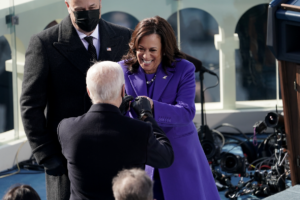Support stories that are silenced elsewhere. Donate to our nonprofit newsroom.
A note from adrienne maree brown: Gilda Sheppard directed a film called Since I Been Down, in which Kimonti Carter was a protagonist as a transformed man leading his community behind bars. The film lit up my abolitionist heart; these storytellers have so much to teach us.
It was a hot summer day in 2007 when I wrapped filming for a documentary about women and children’s organizing and leadership in a refugee camp in Ghana. As I was saying my goodbyes, a woman approached me and said, “You know, Sis, the same AK-47s in child soldiers’ hands in Liberia’s civil war are in your children’s hands [in the United States]. You need to do something about that.”
The comment stuck with me, and ultimately shaped the subsequent decades of my life, when I volunteered to teach sociology courses inside prisons in Washington state, then spent 12 years filming inside those same prisons—and in the neighborhoods, homes, and communities from which those incarcerated people came. I became deeply concerned with how the culture of punishment impacts the lives of children.
Our 2020 documentary, Since I Been Down, is a love letter to those children.
Our film invites viewers to take an in-depth look at incarceration in order to better understand the processes that led a person to prison, their resilience, and prisoners’ ultimate role as models for all of us. Set in Tacoma, Washington, the film bears witness to an “everytown” urban neighborhood’s fight to stay alive in the face of racial profiling by police, gangs, drugs, and gun violence.
The film brings to life statistics of racial and gender disparity in housing, education, employment, and incarceration, and shows viewers the real impact of gentrification through stories from community members impacted by it. Viewers get a window into the ways that incarcerated people are organizing to bring education, healing, and compassion to one another and those who have been harmed—both in and outside prison walls.
In 1993, Washington state voters were the first to pass a “three strikes” lawostensibly designed to discourage “repeat offenders” by implementing increasingly severe sentences for each conviction, including mandatory minimum sentences for specific offenses. Washington is also one of 17 U.S. states that does not offer parole (including for life sentences) and is among the few states that incarcerates youth as young as age 12. It was also among the first cities to set up surveillance cameras in poor and Black communities.
This combination of policies, influenced by the frenzy of the war on drugs and perceptions of escalating crime and gang activity in the fear-mongering political climate of the late 1980s and early 1990s, led Tacoma voters to sacrifice their most vulnerable children, discarded as irredeemable “super predators.” This culture of punishment, combined with the city’s lack of social services, disinvestments in early education, and increasing inequality in housing and employment, stained the Tacoma landscape and destined these children to live their lives out behind bars.
Yet even when thrown into prison for punitive removal from society, these children, now adults, could not be silenced. Together they built a prisoners’ community of healing, anchored in restorative and transformative justice that extended beyond prison walls.
The film chronicles the impact of two prisoner-led groups that have been critical to growing efforts to dismantle the culture of oppression that permeates Tacoma and countless other cities nationwide.
The Black Prisoners’ Caucus (BPC), established in Washington state prisons in 1972, and BPC TEACH (Taking Education and Creating History) in 2013, offer blueprints for repair within the communities they once harmed. Two members of TEACH describe the organization as “a communal learning environment that’s not physical but mental, spiritual, and emotional.” The experiences of BPC and BPC TEACH members illuminate the essential roles of activism, compassion, love, and self-forgiveness in personal and community transformation.
The culture of punishment that groups like BPC are working to dismantle is unfortunately a pervasive element of our shared reality in America today. Especially in these times of legislated violence and fear of difference, who better to show us the triumph of the human spirit than those caught behind bars for life?
The film introduces us to Kimonti Carter, who grew up in Tacoma. He was convicted in 1998 at age 18 of aggravated murder connected to a drive-by shooting. He was sentenced to 777 years, without the possibility of parole. Carter became not only our protagonist but the spine of our film. His story embodies the triumph of the human spirit—even when faced with social forces that attempt to define the margins as a place of deprivation, never of possibility.
In 2021, the Washington Supreme Court ruled that mandatory minimum sentences are unconstitutional for 18-, 19-, and 20-year-olds, pointing to “a rethinking of the culpability and punishment for young people, as science has revealed more about their developing brains,” according to The Seattle Times. This ruling opened the door for Carter’s July 2022 resentencing, when a judge determined that Carter, having served 25 years in prison, must be released.
He now serves as a community outreach specialist with the Washington State Office of Public Defense and continues to work with BPC Community Group and other formerly incarcerated peers and youth in schools, education, health care, prisons, and juvenile facilities. Carter’s goals are reflected in the film, as we see him—then and now—deeply committed to policy change, youth activism, and support for prisoner-initiated programs.
Carter’s leadership was essential to the 2013 creation of BPC’s TEACH program, where incarcerated people teach each other ways that they can create history. TEACH brings together incarcerated people across race, ethnicity, and gang lines, and provides them tools to question oppression, and the violent behavior that oppression perpetuates among and between people.
While filming, I was able to bear witness to a TEACH classroom where a prisoner wearing swastika tattoos spoke with a Black man and a man from Central America about the need for respect; the men questioned their own ideologies and practices, and how they each face similar oppression, despite their differences. We travel this journey with them through candid conversations of scenes fired in a kiln of cinema verité, and cinematically rendered through Krump dancing and masquerade as we bear witness to the nuances of reflective voice, trauma, contemplative silence, fear, and unbinding love.
Our humanity is nudged—and at times ambushed—while watching the film, because the men and women who seem to have an answer to our societal problems have been convicted of violent crimes. The film does not question their innocence or guilt, but rather our own preconceptions about humanity and the tensions between compassion, punishment, crime, and justice. Distinct Black women’s voices provide the tenderness, rhythm, and urgency of this compelling story.
Since I Been Down is dedicated to broadening conversations across significant differences to inspire all of us to become visionary, liberatory thinkers. Our film bears witness to the triumph of the human spirit, allowing us to take a long look at our humanity. As Carter reminds us, “We can never be someone different—but we can be a better version of who we are.”
To request a screening of Since I Been Down, reach out to the filmmaker at info@sinceibeendown.com.
For 30 years, YES! Media has been at the forefront of people power, documenting community solutions that will free us all from unjust systems. As we barrel towards a pivotal election, there is a growing need for journalism like ours.




